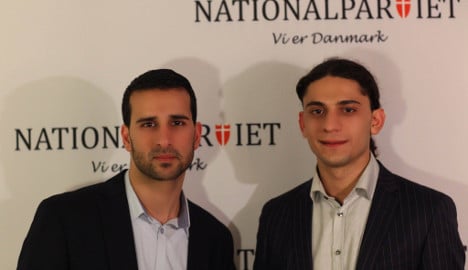The 19-year-old Hassan has for the past couple of years been an active voice in the Danish political debate, particularly on integration. He has not shied away from controversial statements, upsetting both members of the immigrant community and the cultural elite in Denmark.
The National Party's announcement via Facebook on Tuesday that he will join the group may be seen as another such statement.
The party was founded by three men of Pakistani heritage, sports the Danish flag in its name and has a slogan that says: “We are Denmark.”
"I represent the National Party in order to help unite different people in our society," Hassan said in a press release from the National Party on Tuesday.
Attacking both sides
Hassan’s debut self-titled poetry collection 'Yahya Hassan' in 2013 has become the best-selling debut poetry collection in Denmark ever. It has sold more than 100,000 copies.
In his poems, Hassan is critical of parts of his cultural background and takes issue with his parents as well as the religion of Islam.
But he has also hit hard at what Hassan calls Denmark’s social and cultural elite’s double standards. Referring to the absolute freedom of speech debate, he posted pictures on Facebook of a leading Danish author in a Nazi uniform and also portrayed other public figures in a not-so-favourable light.
Hassan has also compared himself to Copenhagen gunman Omar El-Hussein, 22, saying they were about the same age, were both children of Palestinian immigrants and both had a criminal past involving knife attacks, according to Berlingske Tidende. But as one ended up becoming a poet, the other ended up a terrorist. He said that although he did not agree with El-Hussein, he could in some ways understand him.
Collecting voter signatures
The National Party was founded in November 2014 by Kashif Ahmad and his two brothers, all with Pakistani heritage. Their stated goal is to make it acceptable to be tolerant again. The may be perceived as contrasting The Danish People’s Party, which for many years has been tough on immigration and in many ways has taken a patent on all things Danish.
“We are happy and proud that Yahya has chosen to run for us and I look forward to our continued collaboration. He is a breath of fresh air in the political landscape of Denmark,” Ahmad said in the party statement.
The party wants to run in the upcoming parliamentary election – to be held in Denmark by September 15th at the latest – but needs to collect a little more than 20,000 voter signatures before it earns a place on the ballot. The party says it has received about 15,000 signatures so far, of which 8,500 have been approved, according to Politiken.
The party wants to loosen Danish immigration laws and boost the healthcare sector. Immigration and asylum regulation issues have already hit the Danish pre-election debates.
The party has received online death threats on Facebook in the past and reported it to the police.



 Please whitelist us to continue reading.
Please whitelist us to continue reading.
Member comments